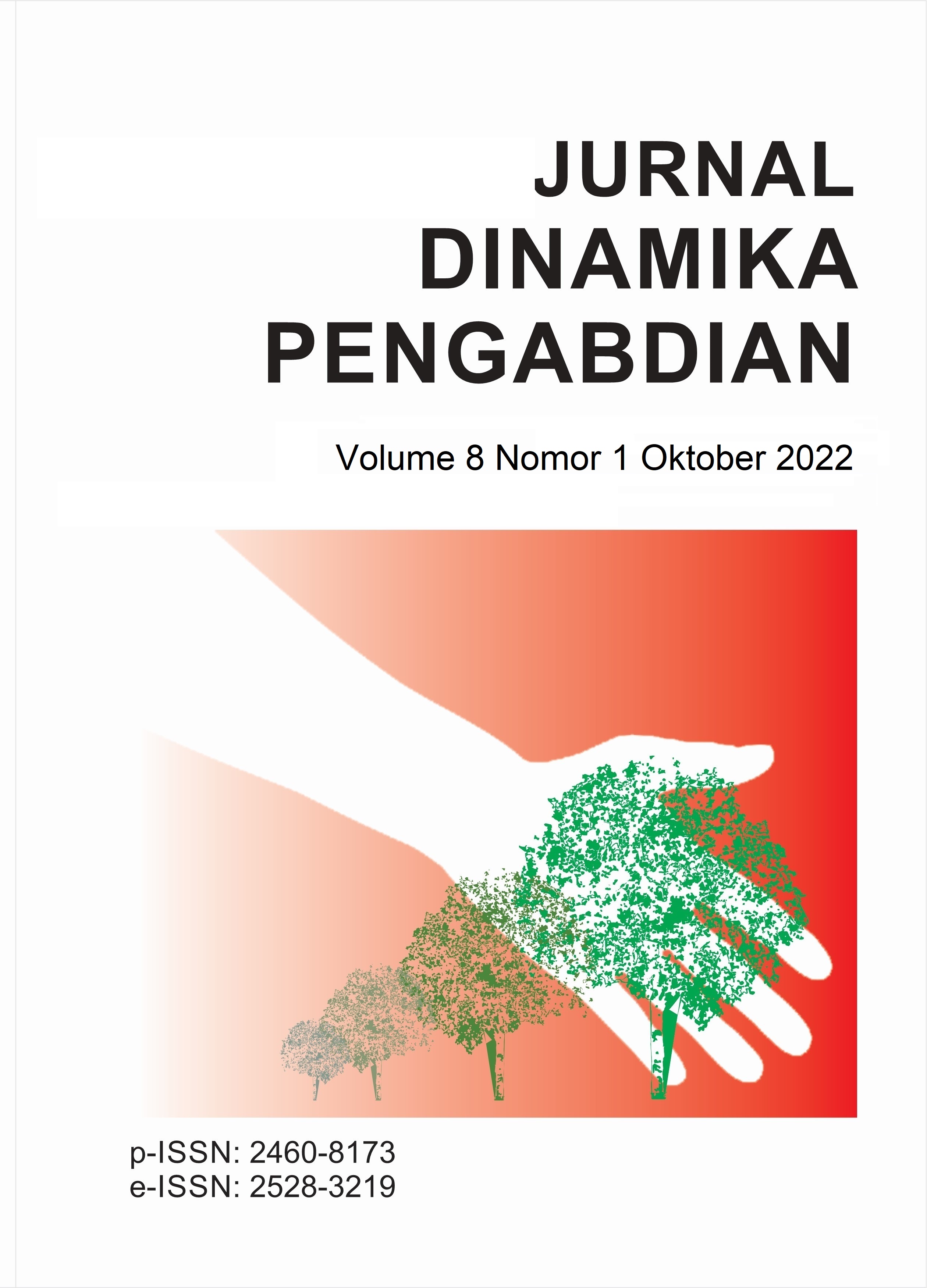PRODUKSI PERMEN KURMA-ASAM JAWA UNTUK PENDERITA DIABETES MELLITUS TYPE-2 PADA IBU RUMAH TANGGA NON PRODUKTIF DI KECAMATAN MANGGALA, KELURAHAN ANTANG, MAKASSAR
DOI:
https://doi.org/10.20956/jdp.v8i1.23857Keywords:
Asam jawa, Diabetes mellitus, Kurma, PermenAbstract
Penyakit tidak menular kronis (PTM) telah muncul sebagai masalah kesehatan global yang besar di negara-negara berpenghasilan rendah dan menengah termasuk Indonesia. Indonesia merupakan salah satu negara ASEAN dengan angka kematian yang didominasi oleh PTM. Berdasarkan data dari Indonesia’s Sample Registration System tahun 2016, penyebab kematian akibat PTM seperti DM ada pada angka (7,9%). Diabetes adalah penyakit kronis yang kompleks yang membutuhkan perawatan medis berkelanjutan dengan strategi pengurangan risiko multifaktorial di luar kendali glikemik. Kombinasi ekstrak daun asam jawa dan kurma ajwa telah terbukti efektif dalam menurunkan kadar glukosa darah dengan dosis sebesar 210 mg/kgBB dan 98 mg/kgBB. Salah satu upaya agar lebih komprehensif untuk mengakselerasi proses hilirisasi hasil penelitian maka kami merancang dan mengembangkan potensi tanaman lokal yaitu daun asam jawa dikombinasikan dengan kurma sebagai pemanis alami menjadi sebuah produk kesehatan herbal dalam bentuk permen untuk pasien diabetes mellitus tipe-2. Target khusus yang telah tercapai dari pelaksanaan kegiatan ini adalah penerapan ipteks melalui pelatihan yakni terjadinya peningkatan pemahaman, pengetahuan dan keterampilan mitra kelompok ibu rumah tangga (IRT) non produktif dalam pengolahan tanaman asam jawa dan kurma terkhusus dalam menghasilkan dan menerapkan PPKM (produksi permen kurma asam jawa) yang lebih berkualitas, sehat dan higienis dengan kemasan yang baik dan ekonomis serta bermanfaat untuk penderita Diabetes Mellitus (DM) Type-2. Mitra mampu menciptakan self medication dan swamedikasi untuk diri sendiri, keluarga dan lingkungan serta adanya peningkatan kualitas hidup yang lebih baik.
Kata kunci: Asam Jawa, Diabetes mellitus, Kurma, Permen.
ABSTRACT
Chronic non-communicable diseases (NCDs) have emerged as a major global health problem in low- and middle-income countries including Indonesia. Indonesia is one of the ASEAN countries with a mortality rate that is dominated by PTM. Based on data from Indonesia's Sample Registration System in 2016, the cause of death due to NCDs such as DM is at 7,9%. Diabetes is a complex chronic disease that requires ongoing medical care with multifactorial risk reduction strategies beyond glycemic control. The combination of tamarind leaf extract and ajwa dates has been proven effective in lowering blood glucose levels at doses of 210 mg/kgBW and 98 mg/kgBW. One of the efforts to be more comprehensive to accelerate the downstream process of research results, we design and develop the potential of local plants, namely tamarind leaves combined with dates as natural sweeteners into a herbal health product in the form of candy for patients with type-2 diabetes mellitus.The specific target that has been achieved from the implementation of this activity is the application of science and technology through training, namely the increase in understanding, knowledge and skills of non-productive housewives (IRT) partners in processing tamarind and dates, especially in producing and implementing PPKM (production of sour date candy). java) which is better quality, healthy and hygienic with good and economical packaging as well as beneficial for people with Diabetes Mellitus (DM) Type-2. Partners are able to create self-medication and self-medication for themselves, their families and the environment as well as to improve the quality of life.
Keywords: Tamarind, Diabetes Mellitus, Dates, Sweets.
References
ADA. 2020. American Diabetes Association: Standards of Medical Care in Diabetes-2020. The Journal of Clinical and Applied Research and Education. 43(1):S1-S212.
Alfaridz, F., Amalia, R. 2013. Review Jurnal: Klasifikasi dan Aktivitas Farmakologi dari Senyawa Aktif Flavonoid. Farmaka. 16(3):1-9.
Al-Samarrai, R., Abdulsalam, A. 2020. Flavonoids and Glycosidic Flavonoids Constituents and Antioxidant Activity of Iraqi Date Palm (Phoenix Dactylifera L.) Seeds. Plant Archives. 20(2):4663-4668.
Alseekh, S., Souza, L., Benina, M., Fernie, A. 2020. The Style and Substance of Plant Flavonoid Decoration; Towards Defining Both Structure and Function. Phytochemistry. 174:1-15.
Armanda, D. 2015. Anatomical Responses of Ajwa Dates Sprouts (Phoenix dactylifera L.) Tonwater Availability and Light Intensity. Journal of Natural Science and Mathematics Research. 1(1):21-25.
Decroli, E. 2019. Diabetes Melitus Tipe 2. Edisi ke-1, Fakultas Kedokteran Universitas Andalas. Padang.
Hestiana, D. W. 2017. Faktor-Faktor yang Berhubungan dengan Kepatuhan dalam Pengelolaan Diet pada Pasien Rawat Jalan Diabetes Mellitus Tipe 2 di Kota Semarang. Journal of Health Education. 2(2):138-145
Nayik, G. A dan Gull, A. 2020. Antioxidants in Fruits: Properties and Health Benefits. Edisi ke-1. Springer. Singapore.
Purnamasari, D. 2018. The Emergence of Non-communicable Disease in Indonesia. The Indonesia Journal of Internal Medicine. 50(4):273-274.
Sukmawati, Rian Iryansyah, Dzikra Maulidyawati, Mayasari, 2021 “Aktivitas Antidiabetes Kombinasi Asam Jawa dan Kurma Ajwa secara In Vivo dan In Vitro” 1stMICPS Prosiding 2021
Downloads
Published
Versions
- 2022-11-12 (3)
- 2022-11-12 (2)
- 2022-11-04 (1)
Issue
Section
License
Copyright (c) 2022 Jurnal Dinamika Pengabdian (JDP)

This work is licensed under a Creative Commons Attribution 4.0 International License.
Penulis diwajibkan untuk menandatangani "Surat Perjanjian Hak Cipta" atau Copyright Agreement untuk penyerahan ijin kepada pihak jurnal untuk menerbitkan tulisannya.
Authors are required to sign a "Copyright Agreement" to submit permission to the journal to publish their writings.



